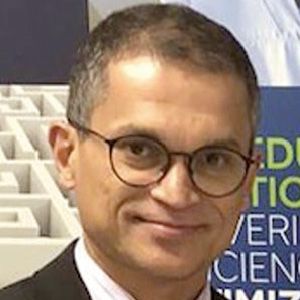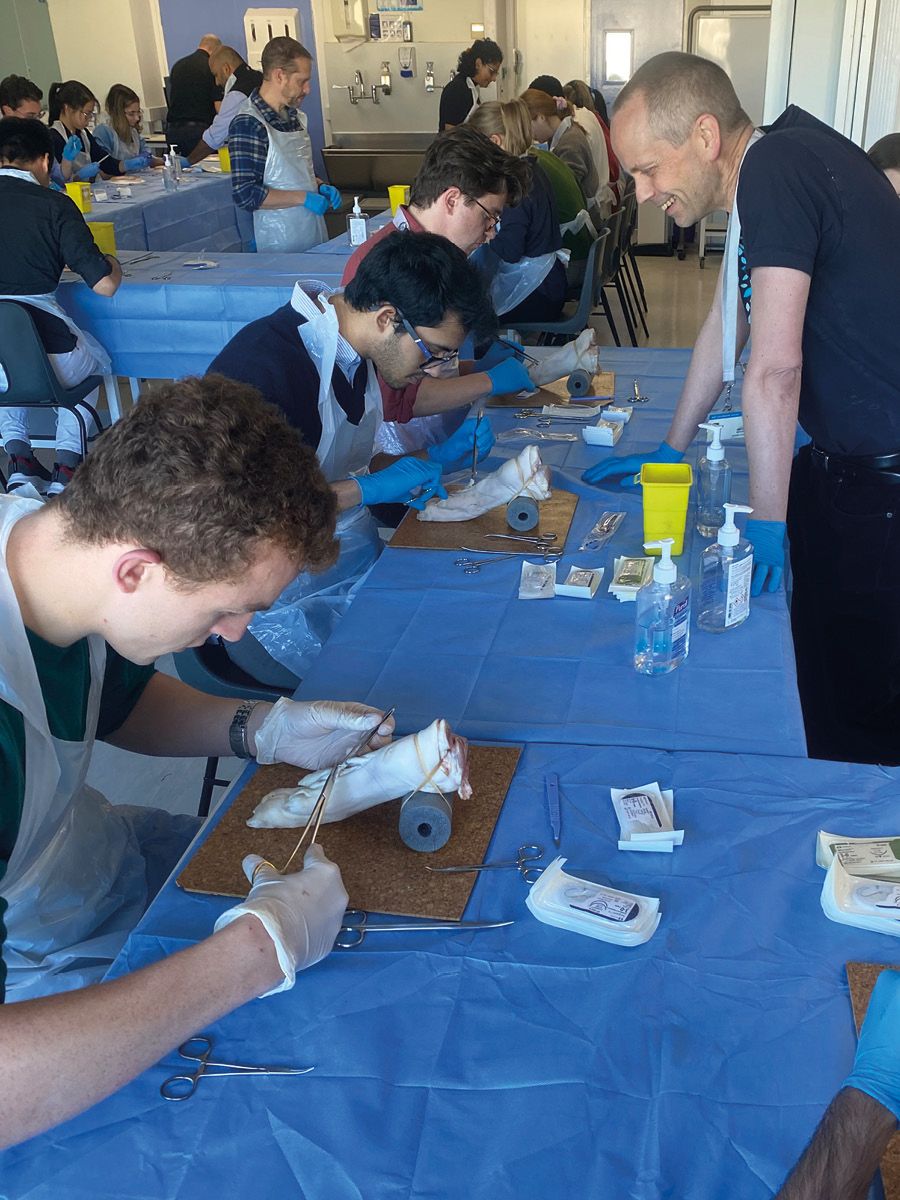milestone
for top skills event
Surgical skills symposium continues to raise the bar for exposure to surgery

< BACK

Mike Silva: RCSEd Council (2022-23) Consultant Surgeon and Clinical Lead,
Hepatobiliary and Pancreatic Surgery
Ten years ago the College, with the help of the Hugh Cairns Surgical Society and the Oxford Foundation Trainees Surgical Society (OxFTSS), organised the 1st Oxford Surgical Skills Symposium, which has been running ever since.
What makes this event unique is the exposure of senior medical students and foundation trainees, 72 per symposium, to disciplines and aspects of surgery not routinely covered in surgical curricula. This is done by providing instructor-led exposure of hands-on experience to surgical skills. On average the symposium has over 30 Faculty in attendance. On 14 October 2023 the team rolled out the 10th edition of this flagship event, which is arguably the best of its kind in the UK.
The Hugh Cairns Surgical Society is one of the best ways for medical students at Oxford University to demonstrate an intention to pursue a career in surgery. OxFTSS was the first such society in the country, set up by Katie Hurst with the support of Mike Silva, then Regional Surgical Advisor for Oxford. Under the stewardship of Silva in his role as director of the Regional Surgical Ambassador network, there are now 15 Foundation Trainees Surgical Societies in the UK.
Presidents galore
Over the years the symposium has welcomed more than 700 participants, many of whom are committed to a career in surgery.
The 10th Oxford Surgical Skills Symposium was made even more special by the presence of College President Professor Rowan Parks and Immediate Past President Professor Mike Griffin, with Past President Professor Mike Lavelle Jones as Faculty.
As has been the case from the first symposium, Medtronic was the main sponsor. This year was also supported by Smith and Nephew, C J Medical and Boston Scientific.
Participants were first split into two groups, then given introductory lectures on three of six surgical stations they would encounter: suturing techniques for tendon repair and electrocautery, an introduction to urology and robotic simulation, the management of thoracic trauma, introduction to laparoscopy, bowel anastomosis and introduction to the management of fractures. The groups then broke up into smaller groups and attended three workstations for one hour each, before breaking for lunch.
During the lunch break Parks, Griffin, Jones, Silva and Hurst cut and shared a 10th anniversary cake. In the afternoon session, the groups swapped over and received the remaining three lectures and attended the relevant three workstations.
Each workshop was manned by consultant surgeons and senior surgical trainees acting as instructors. Tasks commenced with a demonstration of what was expected followed by each delegate given time to familiarise themselves and practise a set of skills. The emphasis was on the experience and not entirely the completion of the task. Instructors provided one-to-one support. Medtronic representatives and sponsors with specialist training in each designated area also assisted.
It was great to have Parks, Griffin and Lavelle Jones offering words of advice and support. The young surgeons could see why the RCSEd is considered the ‘friendly college’. Interacting with consultants and trainees of the Faculty from a range of surgical specialties created a thriving environment in which to learn. The symposium delivered on its aim to provide hands-on experience that would enthuse participants to consider surgery as a career and provide an insight into the various subspecialities.
Winners of the event’s skills competition received a certificate and a gift voucher, as well as Affiliate status of the College with all the benefits that brings.
Station one: Tendon suturing and electrocautery
Participants were taught basic suturing techniques for tendon repair using pigs’ trotters. This station also introduced them to the concept of electrocautery with emphasis on patient and operator safety. This was supplemented by hands-on experience of monopolar, bipolar and LigaSure devices on animal tissue. They also carried out a simulated laparotomy on porcine abdominal wall with the use of diathermy and were taught the principles of laparotomy closure.
Station two: Introduction to urology
and robotic simulation
Delegates had the opportunity to use urological endoscopic platforms to carry out prostate surgery and stone extraction while having one-to-one instruction from the Faculty. This station also offered the opportunity to experience robotic simulation and was one of the most popular workstations. Timed extraction of a ureteric calculus was an exciting exercise, with the winner, Benjamin Chapman, receiving a prize.
Station three: introduction to thoracic trauma
Using porcine heart-lung blocks, this station introduced symposium participants to the management of lung and cardiac injury, and the skills required to suture a stab injury to the heart. The workstation also featured an introduction to the use of stapling devices for the control of bleeding as a result of lung injury.
Station four: Laparoscopic Skills
After trying a range of laparoscopic skills using state-of-the-art trainers and completing simulated exercises, delegates participated in a laparoscopic skills competition, won by Oonagh Stewart, a foundation year one doctor.
Station five: Bowel Anastomosis
Following an initial demonstration, all delegates were provided with porcine small bowel and practised the techniques of hand-sewn bowel anastomosis. Participants who completed the anastomosis also had the opportunity to test its integrity, which made the exercise fun.
Station six: Introduction to
the management of fractures
Using saw bones, the Trauma and Orthopaedics Faculty supplied drills and plates to ‘underpin’ the techniques of fixation of fractures. This was a workstation many participants found surprisingly stimulating and the feedback was exceptional.
Feedback on the day
“Medical students and early surgical trainees learning to do so many practical surgical skills. This is fantastic.”
RCSEd President Rowan Parks
“They are using robots here, taking stones out of ureters, repairing cardiac injuries, fixing fractures and tendon injuries and so much more. These are medical students and foundation trainees. What an opportunity.”
RCSEd Immediate Past President Mike Griffin
“This course has gone from strength to strength in 10 years and has become possibly the best surgical skills course delivered in the UK.”
RCSEd Past President Mike Lavelle Jones

